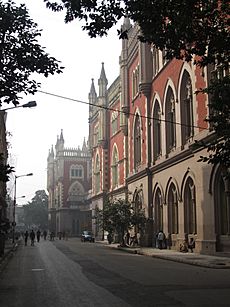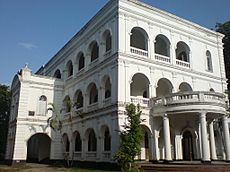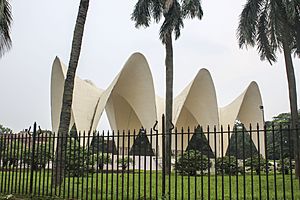A. K. Fazlul Huq facts for kids
Quick facts for kids
Sher-e-Bangla
Lion of Bengal Abul Kasem Fazlul Huq
|
|
|---|---|
|
আবুল কাশেম ফজলুল হক
ابو القاسم فضل الحق |
|
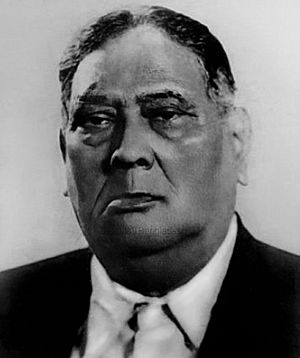 |
|
| 1st Prime Minister of Bengal | |
| In office 1 April 1937 – 29 March 1943 |
|
| Governor General | The Marquess of Linlithgow |
| Governor | Michael Knatchbull, 5th Baron Brabourne John Arthur Herbert |
| Preceded by | Office established |
| Succeeded by | Sir Khawaja Nazimuddin |
| 3rd Chief Minister of East Bengal | |
| In office 3 April 1954 – 29 May 1954 |
|
| Governor | Chaudhry Khaliquzzaman Iskander Mirza |
| Preceded by | Nurul Amin |
| Succeeded by | Abu Hussain Sarkar |
| 5th Interior Minister of Pakistan | |
| In office 11 August 1955 – 9 March 1956 |
|
| President | Iskander Mirza |
| Prime Minister | Chaudhry Muhammad Ali |
| Preceded by | Iskander Mirza |
| Succeeded by | Abdus Sattar |
| 2nd Governor of East Pakistan | |
| In office March 1956 – 13 April 1958 |
|
| President | Iskander Mirza |
| Preceded by | Amiruddin Ahmad |
| Succeeded by | Sultanuddin Ahmad |
| 9th Mayor of Calcutta | |
| In office 30 April 1935 – 29 April 1936 |
|
| Preceded by | Nalini Ranjan Sarkar |
| Succeeded by | Harisankar Paul |
| Personal details | |
| Born |
Abul Kasem Fazlul Huq
26 October 1873 Saturia, Backergunge District, Bengal Presidency |
| Died | 27 April 1962 (aged 88) Dacca, East Pakistan, Pakistan |
| Resting place | Mausoleum of three leaders |
| Nationality | British Indian (1873–1947) Pakistani (1947–1962) |
| Political party | Bengal Provincial Muslim League, All India Muslim League, Indian National Congress, Krishak Praja Party, Sramik Krishak Samajbadi Dal |
| Spouses | Khurshid Begum Jannatunissa Begum Mussammat Khadija Begum |
| Children | 2 daughters and A. K. Faezul Huq |
| Relatives | Razia Banu (granddaughter) |
| Alma mater | Calcutta University |
| Occupation | Lawyer • author • politician |
Abul Kasem Fazlul Huq (born October 26, 1873 – died April 27, 1962) was a famous lawyer, writer, and politician. People often called him Sher-e-Bangla, which means Lion of Bengal. He played a very important role in the history of the Indian subcontinent.
He was a key leader during the British Raj, which was when India was ruled by the British. He served as the first Prime Minister of Bengal from 1937 to 1943. This was a big job, like being the head of a state. He also helped create the idea of an independent Dominion of Pakistan by presenting the Lahore Resolution in 1940.
Fazlul Huq held many important positions throughout his life. He was the Mayor of Calcutta, an Education Minister, and later, after India and Pakistan became separate countries, he served as the Chief Minister and Governor of East Pakistan (which is now Bangladesh). He was known for his powerful speeches and for fighting for the rights of farmers.
Contents
Early Life and Education
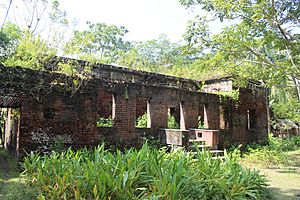
Abul Kasem Fazlul Huq was born on October 26, 1873, in a place called Saturia, which was part of the Bengal Presidency. His family was well-respected. His father, Qazi Muhammad Wajid, was a lawyer, and his grandfather was also involved in law and was a scholar.
Fazlul Huq was a very bright student. He was first taught at home. Later, he went to Barisal District School. He was so smart that he could remember a whole page of a book just by looking at it!
He moved to Calcutta for his higher studies. In 1894, he earned a special degree with honors in chemistry, mathematics, and physics from Presidency College. He then got a master's degree in mathematics in 1896 and a law degree in 1897 from the University of Calcutta.
Career as a Lawyer and Politician
After finishing his education, Fazlul Huq worked as an Assistant Registrar from 1908 to 1912. But he soon decided he wanted to work for the public and practice law. He became a lawyer at the Calcutta High Court and worked there for 40 years.
Joining the Independence Movement
Fazlul Huq became involved in politics early on. In 1906, he attended a conference that led to the creation of the All-India Muslim League. This group aimed to protect the rights of Muslims in British India. In 1913, he was elected to the Bengal Legislative Council.
He became the president of the All India Muslim League in 1916. At the same time, he was also a leader in the Indian National Congress, another major political party that wanted India's independence. It was very rare for someone to hold important positions in both groups at once! He helped create an agreement between the two parties called the Lucknow Pact in 1916.
Fazlul Huq was part of a committee that investigated the Amritsar massacre in 1919, a tragic event where many people were killed by British soldiers. He believed in working within the government system to bring about change, rather than boycotting it.
In 1929, he started the All Bengal Tenants Association, which later became the Krishak Praja Party. This party focused on helping farmers and tenants.
Prime Minister of Bengal
First Term (1937-1941)
In 1937, the first general elections were held in Bengal. Fazlul Huq's Krishak Praja Party won many seats. He formed a team with the Bengal Provincial Muslim League and other independent politicians. He became the first Prime Minister of Bengal.
Helping Farmers and Land Reform
As Prime Minister, Fazlul Huq worked hard to help millions of farmers who were struggling with debt. He introduced new laws like the Bengal Agricultural Debtors' Act and the Money Lenders' Act in 1938. These laws helped reduce the amount of money farmers owed and lowered interest rates. He also made it easier for tenants to transfer their land without paying extra fees to landlords. These changes brought a lot of relief to the poor farmers in Bengal.
The Lahore Resolution
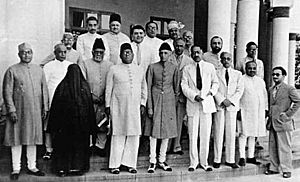
One of Fazlul Huq's most famous moments was in 1940 when he presented the Lahore Resolution. This resolution was a big step towards creating a separate country for Muslims in British India. It suggested that Muslim-majority areas should become "Independent States." This idea eventually led to the creation of Pakistan.
Focus on Education
Fazlul Huq also cared deeply about education. He introduced a bill that made primary education free and compulsory for everyone. He also helped establish many schools and colleges, including Islamia College and Lady Brabourne College in Calcutta.
Second Term (1941-1943)
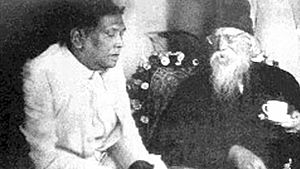
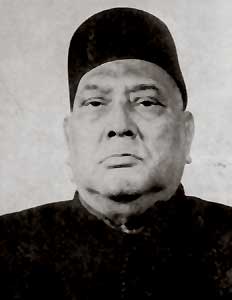
Fazlul Huq formed a second government in 1941. This time, his team included members from different parties, including the Forward Bloc and the Hindu Mahasabha.
During this time, the Second World War was happening, and there were fears of a Japanese invasion. Bengal also faced natural disasters like cyclones. Fazlul Huq faced challenges from the British Governor and other political groups. He eventually resigned in March 1943, after disagreements with the Governor.
Political Career in Pakistan
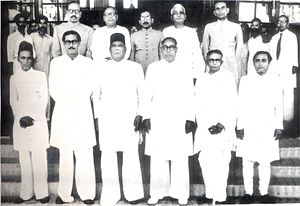
After India was divided in 1947, Fazlul Huq moved to Dhaka, which became part of East Pakistan. He continued to be a very important political figure.
He supported the Bengali Language Movement in 1952, which fought for Bengali to be recognized as a state language of Pakistan. He even got injured during a protest for this cause.
In 1954, he led an alliance called the United Front in the East Bengali elections. They won by a huge margin, and Fazlul Huq became the Chief Minister of East Bengal. During his short time as Chief Minister, he helped establish the Bangla Academy, which promotes the Bengali language and literature.
Later, he served as the Home Minister of Pakistan and then as the Governor of East Pakistan until 1958.
Personal Life
Fazlul Huq was married three times and had two daughters and one son, A. K. Faezul Huq, who also became a politician. He was very good at languages and could speak Bengali, English, Urdu, Arabic, and Persian.
Fazlul Huq passed away in Dhaka on April 27, 1962. He is buried in the Mausoleum of Three Leaders in Dhaka.
Legacy
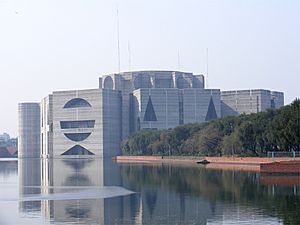
Fazlul Huq is remembered as a great leader who worked tirelessly for the people of Bengal. He helped establish many educational institutions, including Islamia College and Lady Brabourne College. He also played a big part in the founding of Dhaka University.
In Bangladesh, he is seen as one of the most important Bengali statesmen of the 20th century. Many places are named after him, like Sher-e-Bangla Nagar (where the Parliament of Bangladesh is located), Sher-e-Bangla Medical College, and Sher-e-Bangla Mirpur Stadium. In Pakistan, he is also remembered as one of the country's founding fathers.
See Also
- Legislatures of British India


